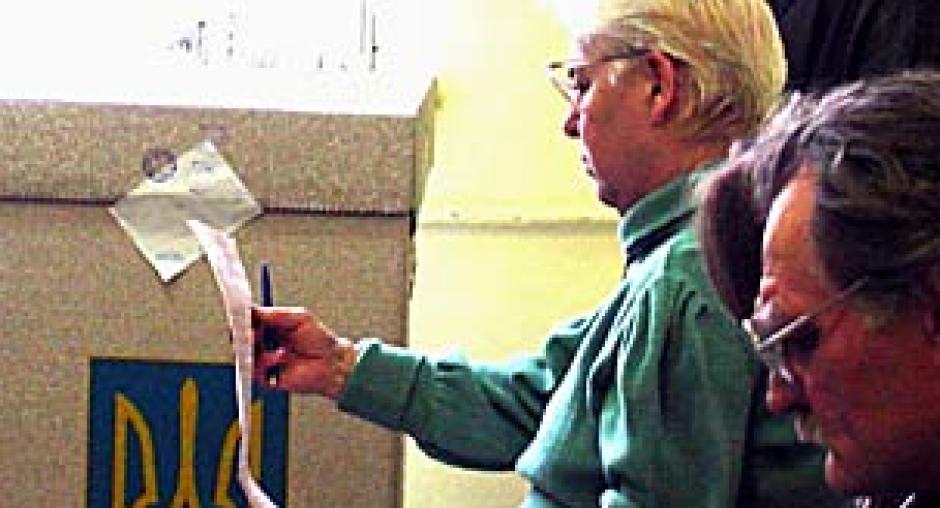Newsroom
Ukrainian parliamentary elections mark progress but flaws persist
KYIV 1 April 2002

A voter studies the ballot paper before voting during the Ukrainian
parliamentary elections. (Jens Eschenbaecher/OSCE) Photo details
KYIV, 1 April 2002 - The parliamentary elections in Ukraine indicate progress towards international standards, but important flaws persist, the International Election Observation Mission said in a statement issued today (attached). The observers declined to draw a final conclusion before crucial post-election procedures are completed, and called on the authorities to ensure full transparency of the ongoing result tabulation process. They announced that they would return to Ukraine for more consultations following the certification of results.
"We are encouraged by the progress made, but the final conclusion on whether these elections have brought Ukraine closer to international standards will depend on the role of the election administration and the judiciary in the post-election phase", said Bruce George, Vice-President of the OSCE Parliamentary Assembly and Special Co-ordinator of the OSCE Chairman-in-Office for these elections.
"The transparency of the electoral process has been improved, but further effort is needed to boost public confidence in the outcome", added Ambassador Michael Wygant, the head of the long-term observation mission deployed by the OSCE Office for Democratic Institutions and Human Rights.
"We will closely follow further developments until the certification of results, and will return to Ukraine shortly thereafter for more discussions and suggestions on how respect for international standards can be better ensured", said Andreas Gross, Vice-President of the Council of Europe's Parliamentary Assembly.
"The institutions represented in this joint mission are prepared to assist the authorities and civil society of Ukraine to overcome the remaining important challenges and to make further improvements towards meeting international standards", confirmed Jan M. Wiersma, President of the European Parliament Delegation to the EU-Ukraine Co-operation Committee.
On the positive side, the international observers highlighted the new and improved election law, an efficient central election administration, and the broad spectrum of 33 parties and blocs with some 7,000 candidates contesting for votes. Media performance generally displayed greater access by candidates and parties through TV debates, free air time and paid advertising. However, virtually all media remained highly biased, and state-funded television gave disproportionate coverage to the pro-presidential candidates.
The international observers noted several other shortcomings which contributed to a general atmosphere of distrust and a low level of public confidence in the election process. These shortcomings included abuse of administrative resources, interference by local authorities, shortcomings in the implementation of the new election legislation, and a campaign marred by the murder of two candidates and other isolated cases of violence as well as allegations of intimidation and harassment against opposition candidates, activists and voters.
The International Election Observation Mission is composed of delegations from the Parliamentary Assemblies of the OSCE and the Council of Europe, the European Parliament, as well as the long-term Election Observation Mission deployed by the OSCE Office for Democratic Institutions and Human Rights (ODIHR).
"We are encouraged by the progress made, but the final conclusion on whether these elections have brought Ukraine closer to international standards will depend on the role of the election administration and the judiciary in the post-election phase", said Bruce George, Vice-President of the OSCE Parliamentary Assembly and Special Co-ordinator of the OSCE Chairman-in-Office for these elections.
"The transparency of the electoral process has been improved, but further effort is needed to boost public confidence in the outcome", added Ambassador Michael Wygant, the head of the long-term observation mission deployed by the OSCE Office for Democratic Institutions and Human Rights.
"We will closely follow further developments until the certification of results, and will return to Ukraine shortly thereafter for more discussions and suggestions on how respect for international standards can be better ensured", said Andreas Gross, Vice-President of the Council of Europe's Parliamentary Assembly.
"The institutions represented in this joint mission are prepared to assist the authorities and civil society of Ukraine to overcome the remaining important challenges and to make further improvements towards meeting international standards", confirmed Jan M. Wiersma, President of the European Parliament Delegation to the EU-Ukraine Co-operation Committee.
On the positive side, the international observers highlighted the new and improved election law, an efficient central election administration, and the broad spectrum of 33 parties and blocs with some 7,000 candidates contesting for votes. Media performance generally displayed greater access by candidates and parties through TV debates, free air time and paid advertising. However, virtually all media remained highly biased, and state-funded television gave disproportionate coverage to the pro-presidential candidates.
The international observers noted several other shortcomings which contributed to a general atmosphere of distrust and a low level of public confidence in the election process. These shortcomings included abuse of administrative resources, interference by local authorities, shortcomings in the implementation of the new election legislation, and a campaign marred by the murder of two candidates and other isolated cases of violence as well as allegations of intimidation and harassment against opposition candidates, activists and voters.
The International Election Observation Mission is composed of delegations from the Parliamentary Assemblies of the OSCE and the Council of Europe, the European Parliament, as well as the long-term Election Observation Mission deployed by the OSCE Office for Democratic Institutions and Human Rights (ODIHR).
